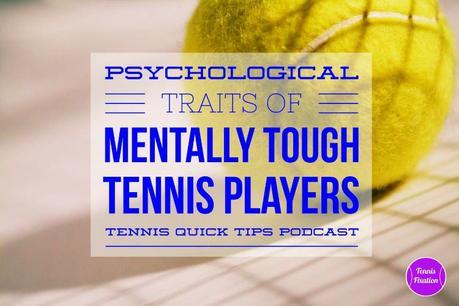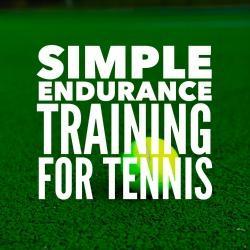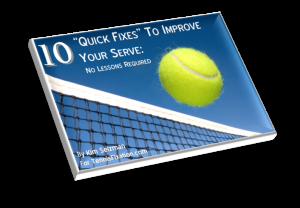Podcast: Play in new window | Download
This week we're talking about mental toughness. Just what are the psychological traits of mentally tough tennis players? Tennis is not just physically demanding, you have got to be tough out there on court. But what does that mean? What is mental toughness for tennis? Because if we don't know what it is, how can we work towards achieving it? In this episode, I'm talking about a study I recently read that not only gave a definition of mental toughness for tennis that we can all use, but discussed some of the psychological traits we need to become and stay tough out on court. You can listen to this episode by clicking on the media player above or by listening in with your favorite podcast app. You can also subscribe in iTunes by clicking on this link: tennisfixation.com/itunes.

SHOW NOTES
Tennis is Mentally Challenging
We already know - tennis is a mentally challenging sport. It's not just physically demanding. You have to be tough out there on the tennis court because there a lot of factors that the sport of tennis has that other sports may not have. For example, there's no time limit on how long your match can last. You can't take any timeouts. You can't have a substitute come in to take your place if you need a break. There's no coaching allowed on the tennis court. And, perhaps one of the most unusual and frustrating aspects of tennis, your opponent is also you umpire out there on the tennis court.
So, yes, you don't just have to be a physically fit tennis player. You have to be a mentally tough tennis player.
What is Mental Toughness for Tennis?
But what does that mean? What is mental toughness for tennis? Because if we don't know what it is, how can we work toward achieving it? This is something I've really thought about recently because of an article I read. I came across this particular article after reading something about it on the International Tennis Performance Association website, which I'm a member of so I have to thank them for leading me to this.
I was able to track the article down online and read the whole thing and it is very interesting. It is an academic article so it's not like something you read in Tennis magazine, but very interesting and with great insights into mental toughness for tennis.
The title of the article is Psychological Predictors of Mental Toughness in Elite Tennis: An Exploratory Study in Learned Resourcefulness and Competitive Trait Anxiety by Richard G. Cowden, Dana K. Fuller and Mark H. Anshel: http://pms.sagepub.com/content/119/3.toc. Yes, that's quite a mouthful but, as I said, it's an academic article that appeared in the journal Perceptual and Motor Skills: Exercise and Sport.
The article sets out the results of a study done by a team at Middle Tennis State University where they looked at a few of the psychological traits that they thought might be applicable to mentally tough tennis players playing elite tennis. Specifically, they studied two tennis teams, a men's team and a women's team, both at NCAA Division I schools. So NCAA Division I college tennis teams - the most elite college tennis teams here in the United States.
Here are the very interesting things that I got out of this article that could help you and I when we're working on our mental toughness.
Why is Tennis So Mentally Challenging?
First, tennis is truly a different sport. It's a lot different than a lot of others. And the authors themselves point out why tennis can be so demanding psychologically. They state:
It is also apparent that the conditions and factors associated with mental toughness differ markedly with tennis and other sports. Specifically, tennis is among the few racquet sports in which athletes are exposed to the natural elements as well as competing on a variety of surfaces, placing them under novel forms of adversity each time competition occurs. It is also among the minority of sports in which athletes are restricted in their ability to communicate, interact and engage with their coach during competition which tests and probes an array of mental attributes, e.g., emotional and cognitive control and self-belief throughout competition. The largely individualistic nature of competitive tennis exposes athletes to rigorous and psychological scrutiny, placing demands on tennis athletes that are absent from team sports.
So the fact that we all think that tennis is mentally challenging is confirmed by what the authors of this study thought. Yeah, it's a different sport. It's a lot different from a lot of others. And it is, in fact, a mentally challenging sport in a way that a lot of other sports just are not.
A Number of Traits Contribute to Mental Toughness for Tennis
So let's talk about what is mental toughness for tennis. Because the authors of this study do try to address this, although I'll tell you, they conclude that there is no conclusion. There's no academic definition of mental toughness for any sport let alone for tennis. And yet, I think they get pretty close to it and when they articulate it, it's the kind of thing that, once you hear it, you do realize, "Oh, that is the kind of thing I need to work toward."
So here is a possible definition for mental toughness for tennis according to the authors:
Mental toughness is an "umbrella" term that reflects the tendency of performers in sport and non-sport to thrive under pressure situations, to overcome setbacks quickly, and to maintain a high level of functioning in the face of continuous challenges.
They go on to point out that, while that might be a possible definition of mental toughness, there are different characteristics that contribute to being a mentally tough tennis player. Some of these traits, traits that they do not address, include having a presence on court, resilience, emotion management, and cognitive skills. In other words, there are several traits that can contribute to being a mentally tough competitor. The two that they looked at in this study were learned resourcefulness and competitive trait anxiety.
Learned Resourcefulness for Tennis
I found the information on learned resourcefulness fascinating because, with elite tennis players, it appears that learned resourcefulness is a predictor of mental toughness and it is something I believe we can work toward.
The authors definite learned resourcefulness as:
A collection of acquired abilities that enable an individual to monitor, control or manipulate dysfunctional internal reactions to reduce the negative influence of these reactions on targeted cognitions, emotions or behaviors.
I know that sounds pretty complicated, but they go on to explain:
These skills include the application of appropriate problem-solving techniques or coping skills using cognitive processes to control emotions and behavioral responses and possessing a self-efficacious outlook on the ability to control or cope with adversarial situations.
In other words, if we can learn coping skills or emotional management skills out on court, if we can learn to control our behaviors out on court, those are things that can help us become mentally tougher. And in fact, we can learn those things. There are techniques and tools that you can use for that. That's not what this article is about but that is a possibility, that you can learn to control your emotions, you can learn to control your behaviors on court, and that will contribute to your mental toughness.
So what do I think learned resourcefulness means? What do I think the authors are talking about? I think they're talking about learning coping skills such as breathing, having on-court rituals, visualization, learning strategies to deal with specific situations that arise on court. All of these are pretty simple things that we can learn, we recreational players can learn. This article is very dense with academic discussion of sports psychology but when you bring it down to the level that I'm talking about, with specific tools that you and I can use, you can see that mental toughness is something that we can work towards and we can achieve.
Avoid Competitive Trait Anxiety in Tennis
Now the other trait that they looked at in this article was competitive trait anxiety. Competitive trait anxiety is when an athlete focuses on competition and sees that competition as threatening. And the authors conclude that being anxious about competition can actually be detrimental to your performance. In fact, they say:
Athletes high in competitive trait anxiety display a tendency to select and focus on threatening conditions or factors resulting in heightened state anxiety experiences.
What this means to me is if you are a person who is particularly nervous in a competition situation, if going into a match, you start getting very worked up, that is not helping you. I know it's easy to say that and it's hard to tell you how to not be that person but think about it. If you're getting anxious, nervous and worked up before your match, you're only hurting yourself. So, just being aware of that, should, I think, help you to realize you need to calm down. You need to have some breathing techniques, you need to have some rituals, to help you be calm because you are not helping yourself by getting worked up before a match.
Captains - Do Not Give Your Team Members Competitive Trait Anxiety!
And my bonus tip that I think about this is, captains of tennis teams, you are not helping your team when you are increasing this competitive trait anxiety of your team members. And you do this when you tell them things like, "You have to win this match" or "We have to have those points." I would say go into those matches, captains, with a calm, upbeat, positive message to give to your team members and do not put that competitive anxiety on them by letting them know how important it is that they win their match. It does not help them.
That's my conclusion. I wanted to let you know about this study because, what it tells me, is that we can all be working toward building our mental toughness. It is doable. There are recognizable traits that mentally tough tennis players have that we can work on. There are also traits that are unhelpful that we need to work to avoid.
Let me know what you think. What do you think it takes to be a mentally tough tennis player? Leave your comments below and let me hear from you.
RESOURCES AND LINKS FROM THIS EPISODE
- Click on this link to be taken to the website where you can download a PDF version of the 2014 article Psychological Predictors of Mental Toughness in Elite Tennis: An Exploratory Study in Learned Resourcefulness and Competitive Trait Anxiety by Richard G. Cowden, Dana K. Fuller and Mark H. Anshel: http://pms.sagepub.com/content/119/3.toc.
SHARE, SUBSCRIBE AND REVIEW
If you want to make sure you never miss an episode, it's easy to subscribe! Just click on one of the buttons below:


You can also get the direct RSS feed for your own favorite RSS Podcast Player by clicking here: Tennis Quick Tips Podcast RSS Feed.
And if you'd like to become a friend of the show, please leave an honest review on iTunes by clicking here: Tennis Quick Tips Podcast iTunes Page. It will help the show become more easily discovered by like-minded, awesome people just like you. I appreciate it!
Looking for a specific episode? All of the Tennis Quick Tips podcast episodes are listed on the Tennis Quick Tips Podcast page. Just click here to find what you're looking for: Tennis Quick Tips Podcast.
BUILD YOUR TENNIS FITNESS AND ENDURANCE
If you're really interested in building your endurance and fitness for tennis, I know you'll like my very first tennis mini-course, Simple Endurance Training for Tennis. For more information or to join the course, just click on the image below or visit: http://tennisfixation.com/endurance.

GET A BETTER SERVE FAST!
And if you're interested in getting a better serve - fast! - get my free ebook, 10 Quick Fixes to Improve Your Serve: No Lessons Required.
By applying the 10 simple tips to your serve that I give in this ebook, your serve can become a tool that you can use to gain control of points. It can become more powerful, more accurate, and something you're actually proud of. Just enter your email below and you'll get instant access to this free ebook as well as weekly updates with all of my best tennis tips!

© Kim Selzman 2016 All Rights Reserved
Full disclosure - Some of the links in this post are Amazon affiliate links. I make a very small commission if you purchase any item using my Amazon affiliate links. Your cost is the same for these items whether or not you use these links. This does not influence my opinion of these items and I always tell the absolute truth about every item that I review. I usually do not review items that I don't like.

